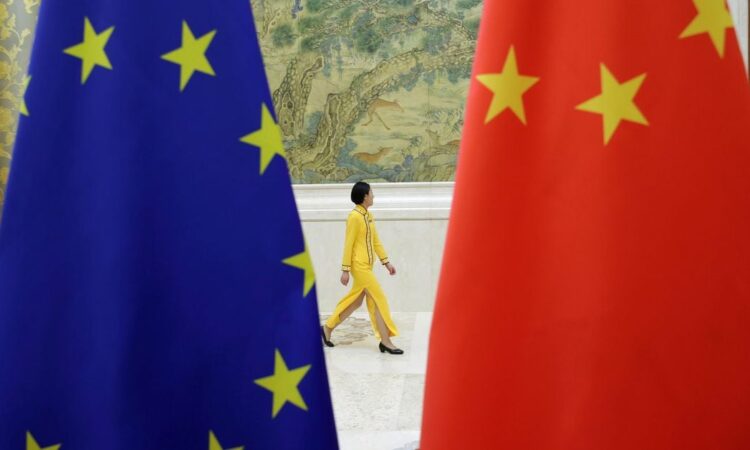
[1/2]An attendant walks past EU and China flags ahead of the EU-China High-level Economic Dialogue at Diaoyutai State Guesthouse in Beijing, China June 25, 2018. REUTERS/Jason Lee/File Photo Acquire Licensing Rights
BRUSSELS, Nov 10 (Reuters) – The European Union and China’s top climate change officials will meet in Beijing for talks next week, ahead of the United Nations’ COP28 climate summit, an EU official told Reuters.
Nearly 200 countries are set to gather from Nov. 30 to Dec. 12 in Dubai for this year’s U.N. climate negotiations, their annual chance to strike global deals to tackle climate change.
EU Climate Commissioner Wopke Hoekstra will travel to Beijing next week for talks with China’s top climate envoy Xie Zhenhua, the EU official said.
It will be their first in-person meeting since Hoekstra, a former Dutch foreign minister, took over responsibility for climate change policies in the 27-country EU last month.
The meeting will be a chance for each side to air their positions and lay the groundwork for deals at COP28, where countries will consider a variety of issues, including whether to agree to phase out carbon-dioxide-emitting fossil fuels.
Deals at U.N. climate summits must be agreed unanimously between all countries. But final agreements are often hammered out among the world’s economic powers. China is the world’s second-biggest economy, after the United States. The EU is the third.
Xie met his U.S. counterpart John Kerry for talks this week in California.
The EU and U.S. are rallying support from governments for a deal at COP28 to triple renewable energy capacity by 2030, and hope to win backing from China. Beijing has signalled an openness to the goal, provided it takes into account the divergent economic conditions of different countries.
China has more renewable energy capacity than any other country. It is also the world’s biggest user of coal, the most highly carbon-emitting fossil fuel.
But Brussels and Beijing are at odds over other climate issues.
The EU is the biggest provider among wealthy nations of climate finance to poorer countries, and plans to push at COP28 for China and other major emerging economies to also contribute to U.N. climate funds.
Beijing resists this. China refers to itself as a developing country, and says wealthy industrialised nations, who are responsible for most of the CO2 emissions causing climate change, must meet their obligations to provide this funding.
Tensions between Europe and China have also mounted after Brussels launched an investigation last month into whether to impose tariffs on imports of Chinese electric vehicle it says are unfairly advantaged by state subsidies.
Reporting by Kate Abnett; additional reporting by Valerie Volcovici; Editing by Christian Schmollinger
Our Standards: The Thomson Reuters Trust Principles.





